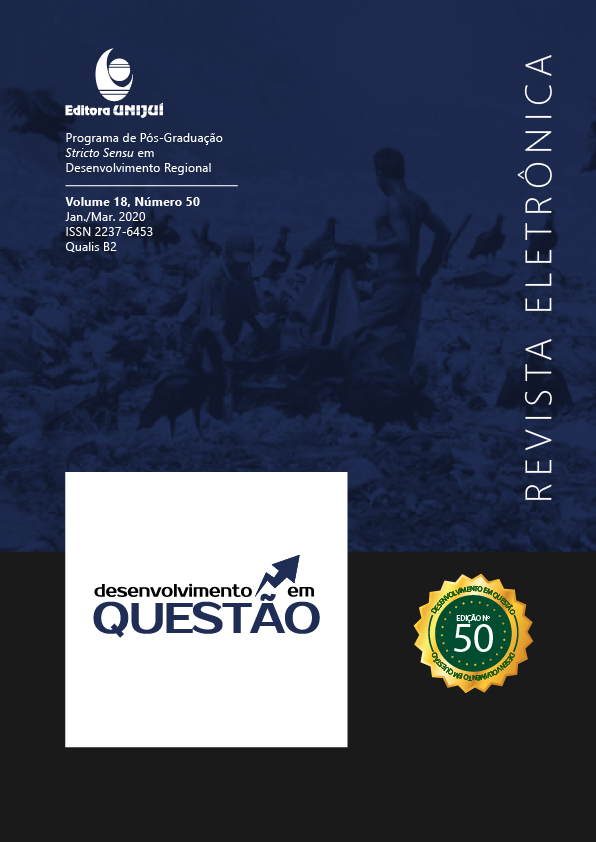O Mercado Convencional da Banana: sujeição da agricultura familiar no Vale do Ribeira-SP
DOI:
https://doi.org/10.21527/2237-6453.2020.50.146-165Palavras-chave:
Desenvolvimento rural, Agricultura familiar, MercadoResumo
Os municípios do Vale do Ribeira apresentam os menores índices de desenvolvimento humano do estado de São Paulo. A principal atividade produtiva do território, a bananicultura, tem efeito significativo no indicador que avalia a geração de renda nesses municípios. Nesse contexto, o artigo visa dar enfasê ao entendimento do chamado “mercado convencional da banana”, procurando demostrar como a atuação de agentes intermediários neste mercado impõe limites à geração de renda na agricultura familiar. Para tanto, foram entrevistados seis gestores de organizações de produtores e trinta e oito produtores de bananas dos municípios de Miracatu e Sete Barras. Identificou-se a presença de agentes intermediários individuais locais e de empresas atacadistas. As empresas atacadistas possuem poder econômico de influenciar e determinar os preços pagos ao produtor, que de um modo geral, é considerado baixo por restringir significativamente a rentabilidade dos agricultores entrevistados. Ainda, os intermediários locais estabeleciam formas de relação com os produtores que criavam outras desvantagens, destacadamente o calote. Conclui-se que a comercialização de bananas no mercado convencional por meio de agentes intermediários inibe possibilidades de desenvolvimento econômico destes agricultores e, por consequência, de todo o território do Vale do Ribeira dependente da comercialização dessas frutas.
Downloads
Publicado
Como Citar
Edição
Seção
Licença
Ao publicar na Revista Desenvolvimento em Questão, os autores concordam com os seguintes termos:
Os trabalhos seguem a licença Creative Commons Atribuição 4.0 Internacional (CC BY 4.0), que permite:
Compartilhar — copiar e redistribuir o material em qualquer meio ou formato;
Adaptar — remixar, transformar e criar a partir do material para qualquer fim, inclusive comercial.
Essas permissões são irrevogáveis, desde que respeitados os seguintes termos:
Atribuição — Atribuição — os autores devem ser devidamente creditados, com link para a licença e indicação de eventuais alterações realizadas.
Sem restrições adicionais — não podem ser aplicadas condições legais ou tecnológicas que restrinjam o uso permitido pela licença.
Avisos:
A licença não se aplica a elementos em domínio público ou cobertos por exceções legais.
A licença não garante todos os direitos necessários para usos específicos (ex.: direitos de imagem, privacidade ou morais).
A revista não se responsabiliza pelas opiniões expressas nos artigos, que são de exclusiva responsabilidade dos autores. O Editor, com o apoio do Comitê Editorial, reserva-se o direito de sugerir ou solicitar modificações quando necessário.
Somente serão aceitos artigos científicos originais, com resultados de pesquisas de interesse que não tenham sido publicados nem submetidos simultaneamente a outro periódico com o mesmo objetivo.
A menção a marcas comerciais ou produtos específicos destina-se apenas à identificação, sem qualquer vínculo promocional por parte dos autores ou da revista.
Contrato de Licença (para artigos publicados a partir de 2025): Os autores mantêm os direitos autorais sobre seu artigo, e concedem a Revista Desenvolvimento em Questão o direito de primeira publicação.











